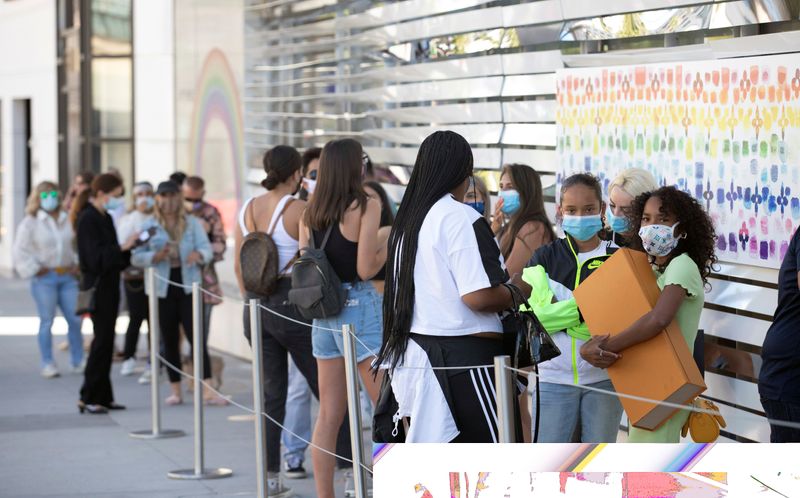By Lucia Mutikani
WASHINGTON (Reuters) - U.S. consumer spending increased more than expected in July, boosting expectations for a sharp rebound in economic growth in the third quarter, though momentum is likely to ebb as the COVID-19 pandemic lingers and money from the government runs out.
The report from the Commerce Department on Friday also showed a rise in personal income after two straight monthly declines, but a chunk of the increase was from unemployment benefits, which were bolstered by a weekly $600 supplement from the government that expired on July 31. Both consumer spending and income remain well below their pre-pandemic levels.
"The consumer is back spending at the shops and malls in July, but many of their purchases reflected pent-up demand following the pandemic lockdown," said Chris Rupkey, chief economist at MUFG in New York. "The expenditures needed to fuel the economy's recovery in August are a big question mark given the hit to personal income nationwide with the loss of those $600 weekly unemployment benefit checks."
Consumer spending, which accounts for more than two-thirds of U.S. economic activity, rose 1.9% last month, after jumping 6.2% in June. Economists polled by Reuters had forecast consumer spending would gain 1.5% in July. July's increase left consumer spending about 4.6% percent below its February level.
Consumers boosted purchases of goods like new motor vehicles. They also lifted spending on healthcare, dining out and hotel and motel accommodation. While spending on goods has rebounded above its pre-pandemic level, outlays on services are about 9.7% from recovery as consumers remain wary of exposure to the coronavirus.
That is a bad omen for the services-based economy, which fell into recession in February. Though new COVID-19 infections have subsided after a broad resurgence through the summer, many hot spots remain, especially at college campuses that have reopened for in-person learning.
The economy suffered its deepest contraction in at least 73 years in the second quarter, with consumer spending at the forefront of the decline in gross domestic product. While economists are anticipating a sharp rebound in GDP in the third quarter, led by consumer spending, they are cutting estimates for the fourth quarter.
Stocks on Wall Street were trading higher while the dollar (DXY) was down against a basket of currencies. Prices of U.S. Treasuries rose.
CONDITIONS UNFAVORABLE
Americans in low-wage jobs have borne the brunt of the economic downturn. Though President Donald Trump extended the jobless benefit supplement, the payout was cut to $300 per week and funding for the program is expected to be depleted by September.
A handful of states are offering the extra unemployment benefit. Economists estimate the loss of the $600 could cut $50 billion from retail sales in August. At least 27 million people are on unemployment benefits.
A survey on Friday from the University of Michigan showed a modest gain in consumer sentiment this month. According to the survey, half of all consumers expected the economy to improve in the year ahead, but many of them viewed the overall economic conditions as unfavorable.
In July, income rose 0.4%, in part as the reopening of more businesses lifted wages. Income fell 1.0% in June. It remains 5% below February's level. Wages gained 1.3%.
Unemployment assistance paid out $1.364 trillion last month, down from $1,470 in June. Economists expect the reduced unemployment benefits supplement will cut income by about $70 billion in August.
With the saving rate at a lofty 17.8%, some believe consumer spending will remain supported for the rest of the third quarter. But others say worries about the economy and the virus' persistence could make consumers reluctant to dip into savings. The saving rate slipped from 19.2% in June.
"It's important to note that the pace of decline in the savings rate has slowed markedly," said Lydia Boussour, a senior U.S. economist at Oxford Economics in New York. "Beyond the mechanical third-quarter rebound, more timely figures confirm that the demand recovery has lost some momentum."
Prospects for third-quarter GDP growth were boosted by another report from the Commerce Department on Friday showing retail inventories rebounding 1.2% in July after declining for several months. That could offset a drag from rising imports, which led to the goods trade deficit widening 11.7% to $79.3 billion in July. Imports increased 11.8%, matching the gain in exports.
July's solid increase in spending boosted monthly consumer prices, though overall inflation remained muted. The Federal Reserve on Thursday rolled out a sweeping rewrite of its mandate, putting new weight on the labor market and less on worries about too-high inflation.
The personal consumption expenditures (PCE) price index excluding the volatile food and energy components rose 0.3% in July, matching June's advance. In the 12 months through July, the so-called core PCE price index climbed 1.3% after increasing 1.1% in June. The core PCE index is the preferred inflation measure for the Fed's 2% target, which is now a flexible average.
